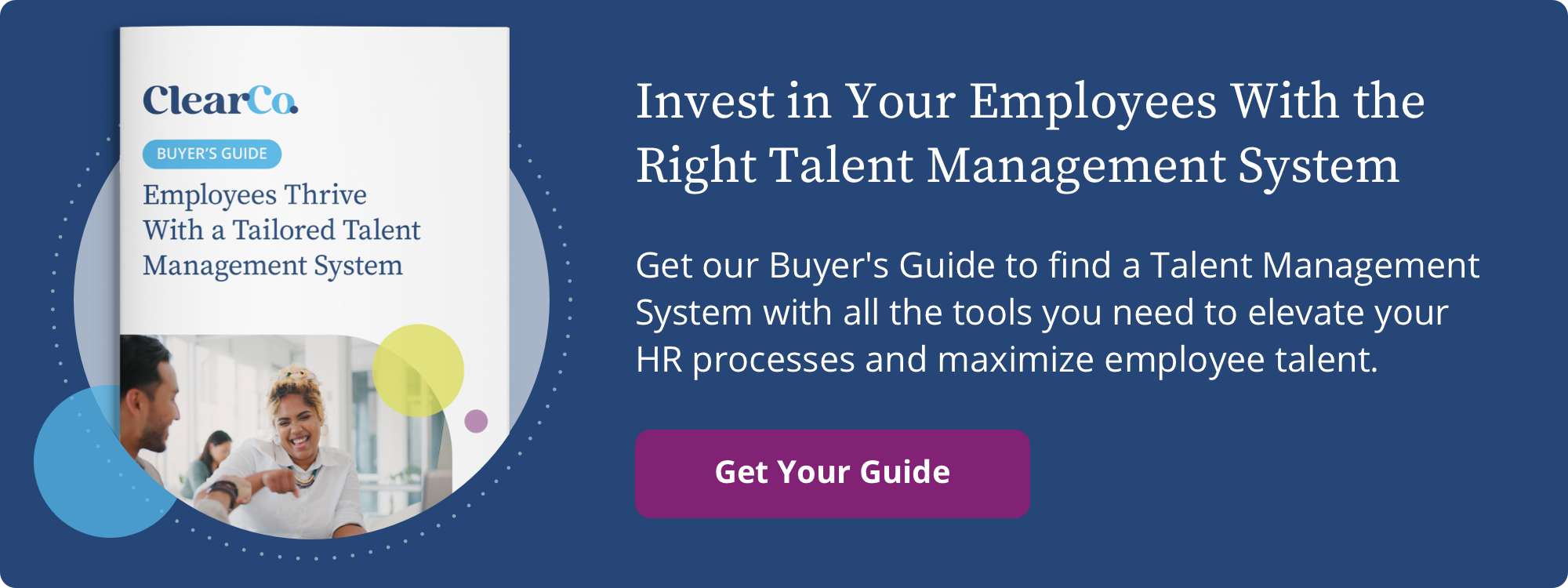It’s a familiar challenge at work: less spending, better results. For HR teams, navigating this balancing act often comes down to smart technology investments. The right tools can do more than save money — they can boost efficiency, too. In fact, according to research from HR.com and ClearCompany, 68% of HR departments using paid tech solutions report improved productivity and effectiveness.
Even so, fewer than three-fifths of organizations believe their current systems align with critical business goals. The question is, how do you stretch your HR tech budget, maximizing return on investment (ROI), and support your company’s bigger picture? Look for platforms that integrate effortlessly, eliminate inefficiencies, and empower your team, and you can deliver impactful results without breaking the bank.
Let’s take a look at some ways your tech might be holding up your team’s progress — and how you can drive better business outcomes with the right software.
HR Technology and Cost Efficiency
Did you know that at many companies, the HR function estimates they spend 20% of their time on repetitive tasks like managing applications and generating offer letters? That’s a full workday each week spent on tasks that don’t move the needle. This kind of work has to be done, but it can be draining for your team and hinders strategic development.
This is where HR technology comes in. It automates the time-consuming, tedious tasks so your team can focus on the parts of HR that move the business forward, like improving employee experience, refining outreach strategies, and planning for future workforce needs.
Here are a few examples of how different types of HR tech save time and money:
- An applicant tracking system (ATS) equipped with artificial intelligence (AI) features can streamline just about every part of the recruitment process, from writing and posting job descriptions to sourcing candidates to scheduling interviews.
- An employee onboarding or talent acquisition platform can make hiring totally paperless. Take onboarding processes completely paperless with digitized forms and electronic signatures. Sync the platform with your payroll system for seamless data transfer and processing.
- Performance management systems keep the review process on schedule and ensure employees get regular, fair feedback. Automated reminders and real-time progress tracking help managers and employees stay aligned on goals, cutting down on delays and miscommunication.
- Learning management systems (LMS) simplify and enhance employee training with on-demand courses and customizable learning paths. An LMS reduces the administrative burden of scheduling and tracking and can upskill employees faster, enhancing productivity and driving retention.
- Talent analytics software provides actionable insights into metrics like turnover rates, attendance trends, and employee engagement. With a clear picture of workforce dynamics, your team can make more informed decisions, reducing guesswork and inefficiencies.
Your HR software ROI calculations shouldn’t just include cost savings — be sure to factor in the ROI of time saved, fewer errors made, and administrative headaches eliminated. With the right tools, your team can regain hours in their week, reduce overhead, and focus on the work that matters most.
The Building Blocks of Cost-Efficient HR Tech
When it comes to building a cost-efficient HR tech stack, not all tools are created equal. Only 10% of HR leaders have built an expert-level, AI-driven tech stack for their teams. Choosing a system with all the right features is essential if you want to remedy inefficiencies instead of making them worse.
These are the essential elements that create a foundation for high-impact, cost-saving HR technology:
1. AI-Powered Tools
AI in HR — and everywhere else — is here, and it’s here to stay. 80% of companies are planning to implement new AI initiatives in HR, and teams are on board. Almost half of HR professionals say AI is critical to future talent acquisition.
The Power of AI in HR
80% of companies are implementing new AI initiatives, and they expect big results from their investments:
- 77% say AI will drive HR productivity
- 71% say it will automate tasks
- 57% say AI will improve analytics
Download the report to dig deeper.
AI significantly reduces the time HR teams spend on tasks that are important but don’t need constant human oversight. It can assist recruiters with writing tasks, helping them compose messages quickly while maintaining the personalization that candidates love. During the interview process, an AI agent can handle note-taking so interviewers can focus on connecting with candidates. An AI-powered ATS even helps you make better decisions with predictive insights, like identifying high-turnover risks or mapping career growth opportunities.
With this level of insight, your team is empowered to act quickly and strategically. You don’t have to make guesses about how to address lagging time-to-hire. Your AI-enhanced talent analytics tell you that there’s a bottleneck after the final interview — hiring teams aren’t submitting their feedback quickly enough to snag top talent. Luckily, your system can send automated feedback reminders to decision-makers, enabling faster hiring decisions without taking up any of your HR team’s time.
With AI, your team is equipped with the tools to take them from a reactive function to a proactive force.
2. Cloud-Based Scalability
At many companies, employees work out of different locations, whether they’re in a traditional office, working remotely, or out in the field. A cloud-based HR system ensures everyone can access what they need, when they need it. Whether they’re an employee updating their performance goals or taking notes for their weekly one-on-one, a recruiter updating a job post, or a hiring manager filling out interview scorecards, all they need to do is log in.
Not only are these systems accessible, but they’re also built to scale alongside growing businesses. Great HR tech can support your high-volume hiring season, revamp your performance review strategy, and design custom career paths that boost retention and engagement.
It’s no wonder 69% of organizations say their HR technology effectively supports remote workers, and 72% report it meets on-site needs. Agile cloud-based systems deliver what your business needs now and in the future.
3. Self-Service Portals
How much of your team’s time is spent answering questions and handling requests that employees can manage themselves? Choose HR tech with a self-service portal to put power back in your employees’ hands and time back in your team’s schedule. Whether they’re completing a training course, updating goals, or filling out a performance review, employees can access everything they need in a few clicks.
These tools make life easier for employees and lift much of the administrative burden off of your HR team, freeing up their time for bigger priorities. That’s why 54% of organizations are planning to expand self-service capabilities — to create a smoother experience for their teams and cut down on unnecessary back-and-forth. With self-service portals, everyone wins, including your bottom line.
4. Integration Capabilities
HR systems don’t exist in a vacuum. From payroll to talent management, systems need to connect seamlessly to keep things running like a well-oiled machine. But when integration falls short, progress often stalls. 81% of organizations say poor integration limits their ability to meet HR goals.
Why? Disconnected systems lead to unnecessary errors, duplicate data entry, and wasted time. Even so, only 39% of organizations say their HR solutions are well-integrated. Clearly, there’s a lot of room for improvement.
Look for a system with robust integrations to ensure HR tech is an asset, streamlining workflows and ensuring accurate, reliable data across every department. Because when your systems work together, so can your team.
Reduce Costs and Improve Efficiency With Your HR Tech
With tech tools that streamline operations, empower employees through self-service, and offer insights that drive smarter decisions, HR can finally step into a truly strategic role. Support your workforce today and lay the groundwork for the workforce of the future when you invest in HR tech.
The future of HR is here, and it’s time to lean in. Unlock the full report today to stay on top of the trends shaping the future of HR tech. Don’t wait — your smarter, more efficient tech-powered HR strategy starts here.


.png)
